COMBATTING CASSAVA VIRAL DISEASES: STAKEHOLDERS REVIEW GHANA’S RESPONSE PLAN AND SIMULATION EXERCISES FROM THREE REGIONS

In a concerted effort to safeguard one of Ghana’s most important crops, stakeholders from various sectors in Ghana came together to review the outcomes of simulation exercises conducted across three cassava growing regions in the country. These exercises aimed to assess the readiness and effectiveness of a response plan designed to mitigate the threat posed by cassava viral diseases like the cassava mosaic disease, which is already endemic in the country and the more damaging Cassava Brown Streak Disease (CBSD) from East Africa, which is spreading towards Ghana according to experts.
Cassava, a cornerstone of Ghana’s agricultural landscape and a staple food for millions, has faced mounting challenges from viral diseases that threaten both food security and livelihoods.
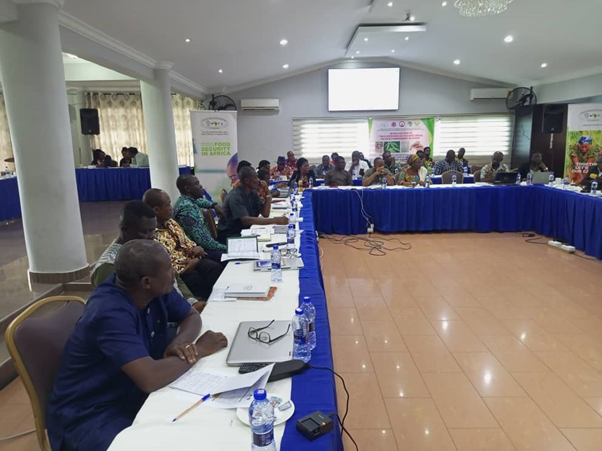
Stakeholders at the 2-day workshop, held from the 14th – 15th August, 2023 in the Eastern region included researchers and policy makers from various institutions such as the CSIR-Crops Research Institute, the Univeristy of Ghana, Legon, the Kwame Nkrumah University of Science and Technology (KNUST), the Plant Protection and Regulatory Services Directorate (PPRSD), CABI International and the Ghana Atomic Energy Commission (GAEC). Others were from the Department of Agriculture from the Ashanti, Eastern and Volta regions among others.
The workshop, which was organized as part of activities under the Central and West African Virus Epidemiology (WAVE) for food security project, was also used to review and revitalize Ghana’s response plan for mitigating cassava viral diseases. In his welcome address, the Director of the Plant Protection and Regulatory Services Directorate (PPRSD), Mr. Eric Bentsil Quaye, welcomed stakeholders to the meeting and stated how important the review meeting was to the future of disease management and cassava cultivation in Ghana. He entreated all stakeholders to give off their best.
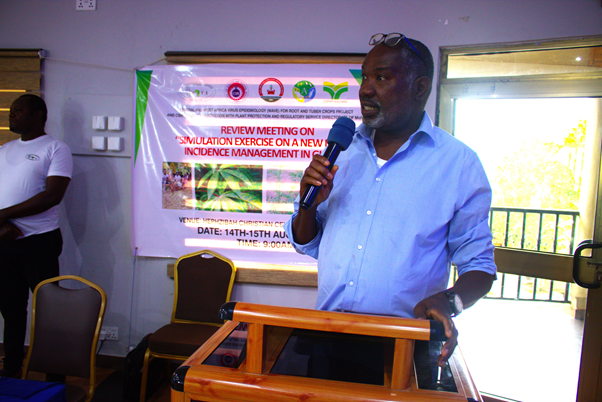
Dr. Allen Oppong, a Plant virologist and a Principal Research Scientist at the CSIR-Crops Research Institute, who is also the coordinator of the WAVE project in Ghana, indicated that, the meeting would afford stakeholders the opportunity to compare the reports on the various simulation exercises to what has been outlined in the response plan in order to improve it. He stressed the importance of cassava to Ghana’s food security status and indicated that any threat to cassava production must be seen as threat to food security which must be dealt with. “We all know the importance of viral diseases and therefore any efforts taken to build our capacities to help us fight against them is in the right direction and must be supported”, he said.
Assessment of Simulation Exercises
o gauge the efficacy of the response plan, simulation exercises were conducted across three regions – the Eastern, Volta, and Ashanti regions. Each exercise was tailored to address region-specific challenges, reflecting the geographical and cultural diversity that defines Ghana.
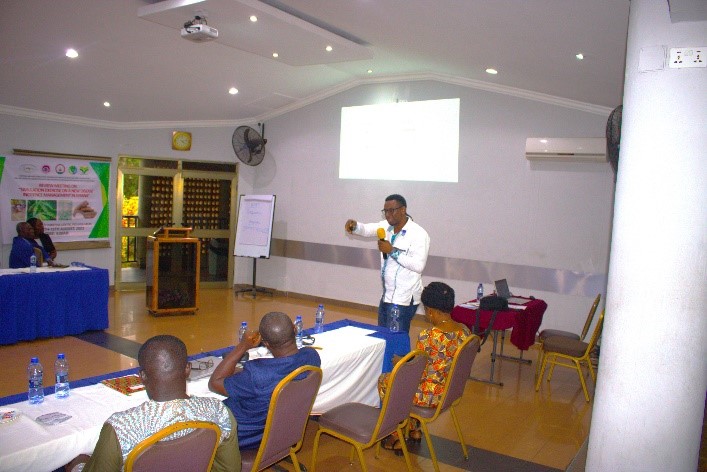
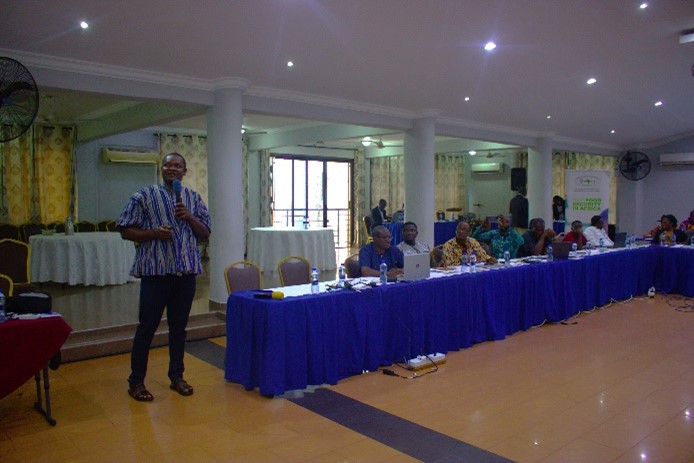
In the Eastern region, participants responded to a fictitious outbreak in two districts. Swift coordination among agents of the department of agriculture and PPRSD officials demonstrated the power of effective communication in containing the spread of the disease.
In the Ashanti and Volta regions, emphasis was placed on community and border engagements. Participants engaged in raising awareness through radio simulations and field visits to curtail the outbreak’s progression.
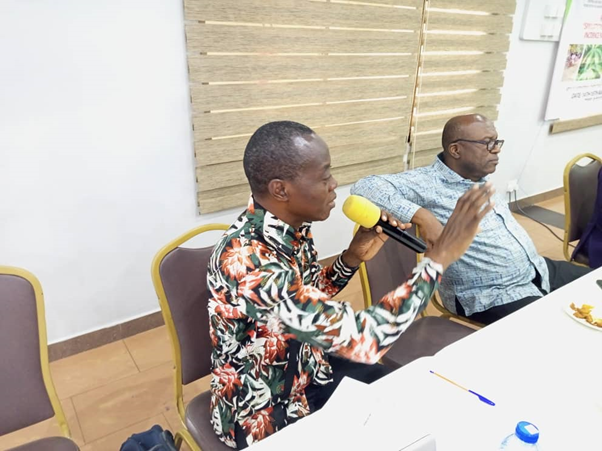
Assessing the simulation exercises underscored the importance of collaboration among the various stakeholders for disease management. Representatives from different regions shared their experiences and insights, highlighting the nuanced differences in disease prevalence and impact. Stakeholders exchanged stories of their struggles and successes, underscoring the need for tailored solutions that considered the unique conditions of each locality. It emerged during the review that a multi-pronged approach, integrating various strategies such as disease-resistant cassava varieties, community education campaigns, early detection systems, farmer training programs, technical expertise, infrastructure among others is the way to go in plant disease management.
Review of Ghana’s Response Plan Against Cassava Viral Diseases
Recognizing the urgency of the situation, the Ghanaian government, in collaboration with agricultural experts and international partners, initiated a comprehensive response plan to address the incidence of viral diseases in 2018. The plan aimed not only to curb the spread of the viral diseases already endemic in the country but to prevent the potential invasion of the more damaging Cassava Brown Streak Disease (CBSD) from East and Central Africa into West Africa, more specifically to Ghana.
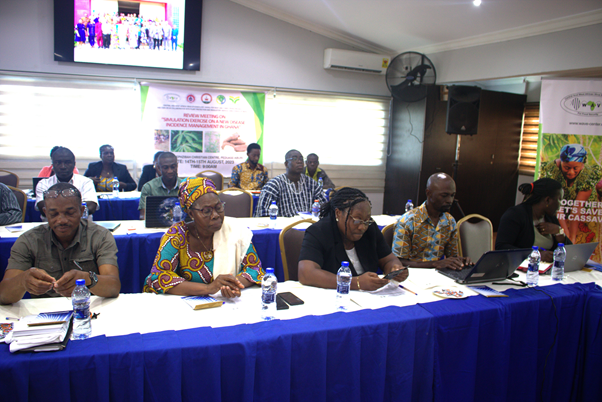
The plan, among other, aimed at setting up an Emergency Operation Centre (EOC) to combat the threat and contain the spread of cassava viral diseases. The EOC would coordinate all detection and response activities. The plan aimed not only to address the immediate threat but also to build a foundation for long-term agricultural resilience.
Stakeholders made inputs into the existing plan to improve it. The reviewed plan will be approved, published, and will serve as a reference document for managing cassava viral diseases in the country.
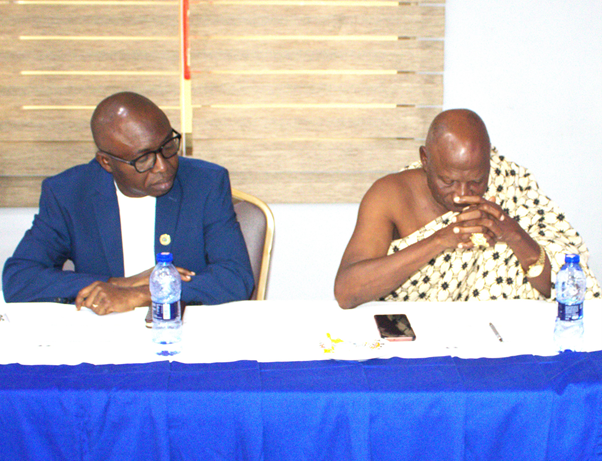
In their concluding remarks, Prof. Elvis Asare-Bediako, the Vice Chancellor of the University of Energy and Natural Resources (UENR), and Nana Fobi Kropa III (Chief of Atwima Apimanim) who chaired the review of the response plan and simulation exercises, expressed their gratitude to the WAVE project and all participants. They stated that, the reviewed response plan will be finalized and published as soon as possible to serve as a guide for combating viral diseases in the country.
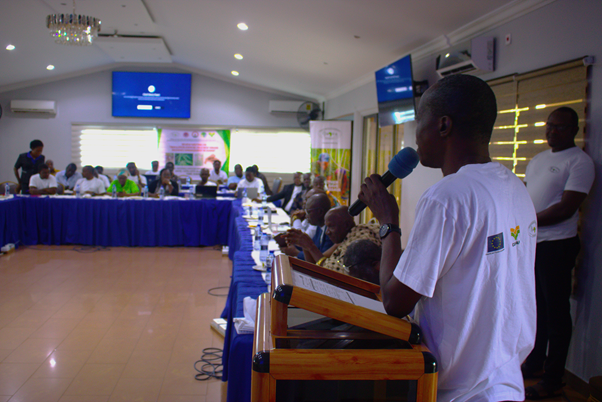
Dr. Allen Oppong was also grateful to the sponsors of the two-day meeting, the Biorisks Project by CORAF, which is funded by the European Union, and indicated that, all the suggested reviews will be used to update the response plan for final approval and publication.
Authors: Bernard Sakyiamah, Dr. Allen Oppong, Enoch Bobie Agyemang
